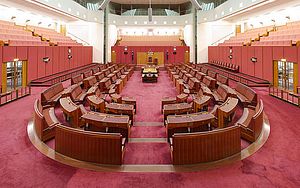Last week the final allocation of seats was concluded for the Australian Senate. Due to the nature of the unique proportional-preferential system, and the number of candidates who run for the chamber, counting is far more complex and time-consuming than the House of Representatives, where the government is formed.
While the lower house results were bad for the Malcolm Turnbull-led government, reducing their 21 seat majority to just 1 seat, the results in the Senate will further consolidate their woes. The conservative Coalition lost three seats in the 76 seat chamber, and a further array of small parties and independents were elected.
The primary reason for the government calling a Double Dissolution election, where the entire Senate went up for re-election rather than just half the Senate as in a normal election, was to attempt clear the Senate of the small parties and independents (known as the “crossbench”), which the government had difficulty negotiating with in the previous parliament
The election also saw the implementation of a new voting system in the Senate, designed to give people a more direct say in how preferences are allocated. However, unfortunately for the government, giving people greater choice on how to allocate their preferences simply led to people preferencing away from the major parties. Thirty-five percent of people voted for a party other than those in the conservative Coalition or the Labor Party. This was an increase of 2 percent from the 2013 election, and continues a consistent trend in this direction in the 21st century.
The combination of the new system and the Double Dissolution has backfired spectacularly on the government, with the crossbench expanding from eight senators to 11. The larger crossbench undoubtedly will prove a greater headache for the prime minister than in the previous parliament.
Alongside the Greens, who went from 10 senators to nine, there are now two other minor parties with multiple senators: the far-right One Nation party with four senators and the nonpartisan protectionist Nick Xenophon Team with three. The vanity project of popular South Australian Senator Nick Xenophon also has one member of the House of Representatives, all from struggling South Australia.
These two parties are joined by Tasmanian populist Jackie Lambie, Bob Day from the Christian conservative Family First party, the stereotypical conservative libertarian David Leyonhjelm from the Liberal-Democrats, and radio broadcaster and anti-pedophile crusader, Derryn Hinch.
The resurgence of the One Nation party, a party of ethnic nationalists, Islamophobes, and climate change conspiracy theorists, has been the most significant outcome from this election. Having won a seat in the Federal Parliament as an independent in 1996, Pauline Hanson became a vocal critic of Asian immigration to Australia. She then formed the One Nation party and in 1998 won 11 seats and 22 percent of the vote in the Queensland state legislature. Yet, the party soon fell apart due to the disorganized nature of its bitter and angry zeal.
However, anxieties about global terrorism, along with the inability of political elites to try and temper these anxieties through education and clear explanations, has created fertile ground for the reappearance of the party on the political landscape. This combined with the Double Dissolution halving the number of votes required to win a seat in the Senate made it far easier for a party like One Nation to be elected.
At a normal half-Senate election, the percentage of the vote received by One Nation would have led to the probability of just one senator being elected; the Double Dissolution allowed four to be elected quite easily. The government showed no broader understanding of the country’s political temperature when it sought a Double Dissolution, and no responsibility toward the country’s minority populations, who now face four aggressive senators with guaranteed media exposure.
Due to the numbers now in the Senate, if Labor and the Greens oppose any legislation, the government cannot pass any bills without the support of One Nation. This presents a dangerous position for the country, and especially for the government in having to work with a party that has extreme and ill-informed views.
Of course, if the government was to simply work with the Labor Party to pass legislation in a de facto Grand Coalition then they would avoid having to taint themselves with One Nation’s votes and remove the constant oxygen they will give the party in having to negotiate with them. They would also win the respect of a great swath of middle Australia who would prefer a more cooperative bipartisan approach to politics over the usual theatrical bickering.
However, as Malcolm Turnbull lost his leadership of the Liberal Party in 2009 for cooperating with the Labor Party, if now in government he attempts to do likewise he would again rankle those in his own party to whom doing so is sacrilege. This highlights the precarious position Turnbull is in. With just a one seat majority in the lower house, and grave internal party divisions, finding a way to govern both stably and responsibly looks set to be to be very difficult for him.

































